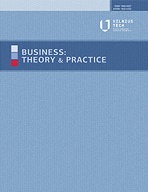Analytical evaluation of the prospects for sustainable development of environmentally oriented tourism business
Analytical evaluation of the prospects for sustainable development of environmentally oriented tourism business
Author(s): Iryna Lesik, Maksym Lesik, Kateryna Tishechkina, Iuliia Ushkarenko, Andrii Soloviov, Artem LahoiskyiSubject(s): Business Economy / Management, Regional Geography, Economic development, Tourism
Published by: Vilnius Gediminas Technical University
Keywords: ecotourism; sustainable development; business; efficiency; infrastructure; cluster model; Ukraine;
Summary/Abstract: The purpose of the article is to study the features of the development of the regions of Ukraine, the formation of a model of sustainable development of ecotourism. The bibliographic method made it possible to study the basic concepts, controversial and problematic issues, as well as the experience of solving them, proposed by scientists from different countries in this area of research. The analysis of efficiency has revealed the most competitive regions of Ukraine for conducting an environmentally oriented tourism business. The correlation and regression analysis results showed that the coefficient of determination R-square indicates a 94% correlation between the studied indicators. The growing dynamics of the number of subjects of tourist activity in Ukraine is noted. The primary data for cluster analysis were preliminarily formed, the presence of advantages and risks (anthropogenic effects) in 24 regions was determined, and promising directions for the development of ecotourism were identified. Cluster analysis, carried out using IBM SPSS software, determined the Euclidean distance and grouped the analyzed regions of Ukraine into clusters with the most similar characteristics. As a result of the study, the author’s vision of the essence of ecotourism, the logic of applying the methodology of cluster analysis was substantiated. The hypothesis about the influence of cultural heritage sites on the number of tourists was refuted. Some recommendations are given for further improvement of the quality of ecotourism development as a priority direction in the formation of sustainable development. The study’s practical significance lies in the fact that the results of the work carried out can be used as reference material for those studying the topic.
Journal: Verslas: teorija ir praktika
- Issue Year: 22/2021
- Issue No: 2
- Page Range: 318-329
- Page Count: 12
- Language: English

